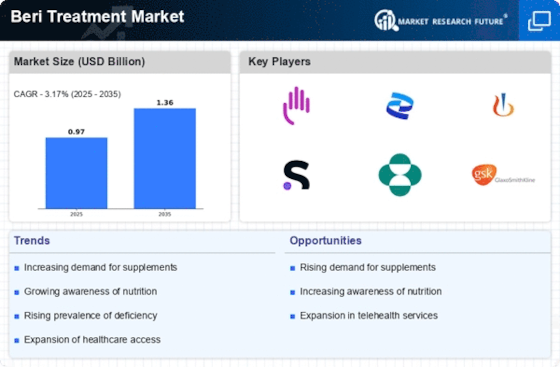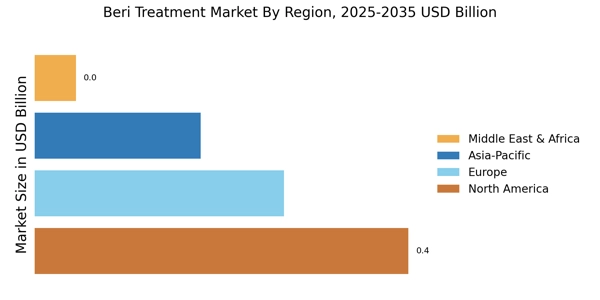Rising Incidence of Beri Cases
The increasing incidence of Beri cases is a notable driver for the Beri Treatment Market. Nutritional deficiencies, particularly in regions with limited access to diverse food sources, have led to a rise in thiamine deficiency, which is the primary cause of Beri. According to health reports, certain areas have seen a 20% increase in diagnosed cases over the past few years. This trend necessitates the development and availability of effective treatment options, thereby propelling the market forward. As healthcare systems recognize the importance of addressing nutritional deficiencies, investments in treatment modalities are likely to increase, further stimulating the Beri Treatment Market.
Advancements in Medical Research
Advancements in medical research are significantly influencing the Beri Treatment Market. Ongoing studies into the pathophysiology of Beri and its treatment options have led to the development of innovative therapies and nutritional supplements. Research indicates that targeted therapies may improve patient outcomes, which could enhance the overall treatment landscape. Furthermore, the collaboration between academic institutions and pharmaceutical companies is fostering the creation of new treatment protocols. As these advancements continue to emerge, they are expected to attract investment and interest in the Beri Treatment Market, potentially leading to more effective solutions for patients.
Increased Focus on Preventive Healthcare
The increased focus on preventive healthcare is emerging as a significant driver for the Beri Treatment Market. Healthcare providers are increasingly emphasizing the importance of preventing diseases through proper nutrition and lifestyle choices. This shift in focus is likely to lead to greater awareness of Beri and its causes, prompting individuals to seek preventive measures. Educational programs and community health initiatives are being developed to inform the public about the risks associated with thiamine deficiency. As awareness grows, the demand for treatments and preventive strategies within the Beri Treatment Market is expected to rise, fostering a proactive approach to health.
Government Initiatives and Health Policies
Government initiatives aimed at combating nutritional deficiencies are a crucial driver for the Beri Treatment Market. Various countries have implemented health policies that focus on improving food security and access to essential nutrients. For instance, public health campaigns promoting thiamine-rich foods have been launched in several regions, which may lead to a decrease in Beri cases. Additionally, funding for research and treatment programs is being allocated to address this public health concern. These initiatives not only raise awareness but also create a supportive environment for the growth of the Beri Treatment Market, as they encourage the development of effective treatment options.
Growing Demand for Nutritional Supplements
The growing demand for nutritional supplements is driving the Beri Treatment Market. As consumers become more health-conscious, there is an increasing interest in dietary supplements that can prevent or treat nutritional deficiencies, including thiamine deficiency. Market data suggests that the nutritional supplement sector is projected to grow at a compound annual growth rate of 8% over the next five years. This trend is likely to benefit the Beri Treatment Market, as more individuals seek preventive measures and treatments that include thiamine supplements. The rise in self-medication and the popularity of holistic health approaches further contribute to this demand.

















